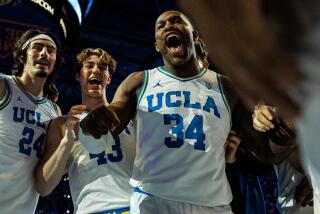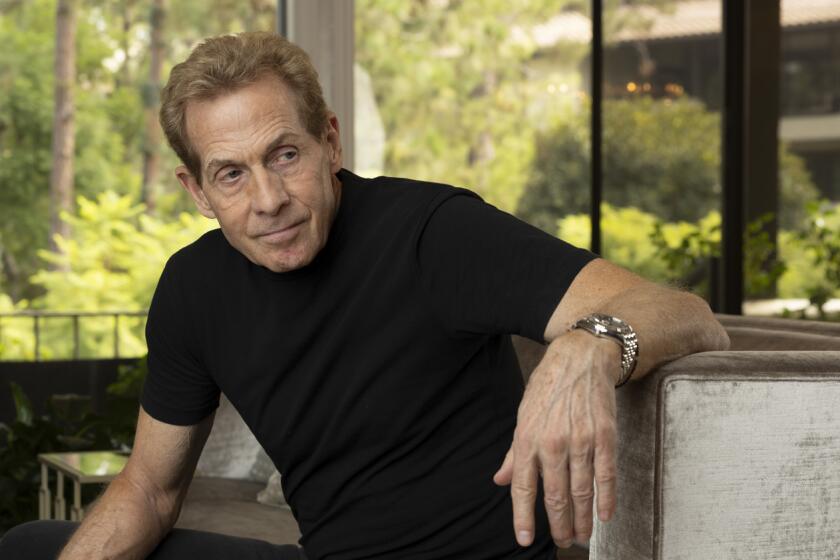Troubled New World : Sutton Takes Over at Kentucky Just as New Charges of Wrongdoing Surface
LEXINGTON, Ky. — They hang from the rafters at Rupp Arena, almost gaudy even though their colors are basic blue and white. Eye-catching, nonetheless, impossible to miss as you stand on the floor of the huge building.
There are 10 of them. On the far left is the one that says, “NIT Champions 1946.” On the far right is the one that reads, “NCAA Final Four 1984.” In between are five that read “NCAA Champions,” and three others celebrating memorable titles.
Those 10 banners are tangible symbols of the basketball tradition that the University of Kentucky is so proud of, to the point of arrogance. Kentucky people always ask visitors here, “Have you ever seen a game in Rupp?” The implication is that until you do, you have not really seen what college basketball is all about.
But these days, the banners, tangible and real, have an intangible taint. For years, there have been whispers in the college basketball world about Kentucky, how the school acquired its players and how it kept them happy. But until Oct. 27, there was never any palpable evidence that the stories were anything more than a copout for those who couldn’t keep up with Kentucky.
That changed when the Lexington Herald-Leader published the results of an extraordinary seven-month investigation conducted by two members of its staff. The newspaper quoted 26 former players as saying they had received payoffs from alumni while playing for Kentucky.
With on-the-record quotes, it detailed locker-room handshakes that included cash, overpayments for speaking engagements, lucrative ticket-scalping and free meals at restaurants, one of them co-owned by Athletic Director Cliff Hagan.
All these events took place during the 13-year regime of Joe B. Hall, who resigned as Kentucky coach last March. Hall has denied any knowledge of the goings-on, although he always opened his locker room to big money boosters and controlled 325 tickets to each game himself.
Hall still has a second-row seat at Rupp Arena and has become a vice president at a local bank. In his place is Eddie Sutton, 49, a man with impeccable coaching credentials, having built excellent programs from the ground up at both Creighton and Arkansas.
With his good-ol’-boy voice and tales of growing up on a Kansas farm with no indoor plumbing, Sutton can charm many of the questioners. And, because Sutton wasn’t here when all the alleged payoffs took place, he has been put front and center by the university in the aftermath of what has gone on.
“I didn’t know anything about all this when I took the job,” he said last week. “I knew there were some questions raised about all of Joe’s tickets. I heard about that when Joe announced his resignation. I called in each of our players individually and asked them if they had ever been involved in anything like this and they told me they hadn’t. I believe them. I’m comfortable with that.”
Sutton has taken steps to cut back on alumni contact with the players. No longer do boosters overrun the locker room after games. They also are barred from Wildcat Lodge, the posh dorm in which the basketball players live. And, Sutton has ordered all his players who own cars to register them with Hagan’s office--how each was paid for and from whom they were bought.
University President Otis Singletary has ordered an investigation into the Herald-Leader stories and the NCAA also is investigating. Singletary and Hagan have refused to answer questions from reporters about the articles.
The players have answered questions, but carefully. “Our concern is playing basketball, not newspaper articles,” said all-America forward Kenny Walker. “We can’t concern ourselves with that stuff.”
What seems to be prevailing sentiment here is that the newspaper, not the university, has done wrong. The Herald-Leader received a bomb threat the week the stories appeared, there have been numerous subscription cancellations and a general outcry from fans angry not with Kentucky for breaking the rules, but with the newspaper for reporting what happened.
Because Singletary and Hagan have chosen not to deal with the questions, Sutton, the newcomer, answers them.
“That stuff about handshakes in the locker room,” he said. “That’s just got to be a bunch of bull. I mean, why would you do it in the locker room? I don’t understand that. Of course, in the excitement of a big victory I suppose an alumnus at any school might do something like that.”
Except that at most other schools, the only visitors in the locker room were reporters, not boosters. Now, that is also true at Kentucky.
What will happen next? Some say the NCAA, which does not have subpoena power, will never uncover what the Herald-Leader did and Kentucky will go unpenalized. Others insist the NCAA must penalize Kentucky or face another fusillade of criticism.
“What’s important is that these things have come out in public, all around the country,” said Notre Dame Coach Digger Phelps, who has been a leading critic of schools that don’t play by the rules. “I’m just sitting back every week and following all the soap operas around the country. What the NCAA does, what the public does, is up to them. Just so the truth comes out.”










